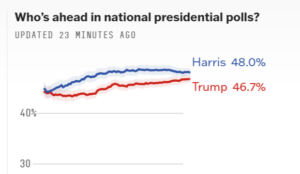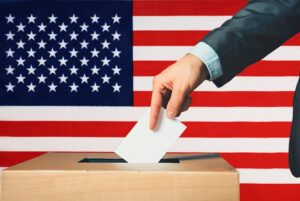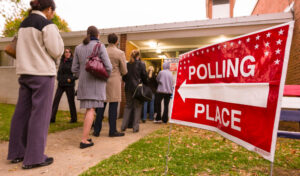(Donkeyworx/Shutterstock)
With lower than every week till the 2024 presidential election, People are intently watching polls to see whether or not Kamala Harris or Donald Trump will turn into the forty eighth president of america. However can we belief the polls? After failing to precisely predict the outcomes of the 2016 and 2020 elections, the query stays open.
After a long time of comparatively correct political polling, People have been shocked to be taught on November 9, 2016 that many of the polls, predicting a transparent victory for Hillary Clinton, turned out to be flawed. Whereas the primary motive for the error was clear (when setting up their statistical samples, pollsters incorrectly predicted who would truly vote), the underlying causes driving this phenomenon have been unclear and have been the topic of a lot debate.
One of many attainable causes is a phenomenon that has been known as the “Shy Trump Voter” impact, which states that social stigma leads potential Trump voters to cover their political predilection, a phenomenon that first appeared with the “Shy Trump Voter” impact. timid conservative” that led to the shock Brexit vote in the UK in early 2016.
Along with avoiding pollsters, shy Trump voters might merely mislead them. It is a statistical supply of error that has been estimated to distort ballot outcomes by as much as 4%, a considerable quantity when elections are shut.
There’s loads of proof to recommend that much less politically engaged voters, resembling Trump supporters are usually, are much less prone to take part in polls, writes Nate Cohn, chief political analyst on the New York Occasions.
“Pollsters have recognized for many years that much less engaged and fewer political voters are much less doubtless to reply to polls,” Cohn wrote in a current story on the state of political polls. “This may increasingly even appear apparent: a political junkie would naturally be extra excited to take part in a survey than somebody with little interest in politics.”
The Shy Trump Voter impact is a widely known supply of error. However there are different sources that ought to be thought of, says Steve Bennett, senior director of the Workplace of Public Preparedness and Company Planning at SAS.
“Some organizations that mixed reside interviews and autodialer calls discovered that Trump did higher when voters shared their voting intention with a recorded voice slightly than a reside one,” Bennett says. “The impact seemed to be most pronounced for girls who supported Trump, who seemed to be much less prone to say they might really feel comfy speaking to a pollster about their vote.
Cohn says the shy Trump voter is the primary driver of statistical error in one among his two theories for why political polls proceed to have issues. Dubbed the Unified Concept, pollsters merely can’t adequately signify politically disengaged voters in setting up political polls, he says. And when these timid Trump voters truly present up for election – primarily presidential elections each 4 years, the place Republicans are inclined to do higher (whereas Democrats are inclined to do higher in midterm elections) – there is no such thing as a a lot they will do to counteract it.
Cohn’s different principle, which he calls Patchwork Concept, additionally contains different elements, together with demographic adjustments and the affect of the Covid-19 pandemic.
In 2020, many individuals adopted authorities orders to remain house to attenuate their very own publicity to the virus and cut back neighborhood transmission charges. That had the impact of accelerating the response charge to surveys, which pollsters initially applauded, Cohn writes.

Nationwide polls present presidential race inside margin of error (Picture courtesy of ABC Information)
However because the yr progressed, many individuals started to return to work and due to this fact weren’t as accessible to reply survey questions, whether or not via cellphone calls, on the Net, by e-mail and even via textual content message surveys. And it seems that individuals who have been extra prone to return to work have been additionally extra prone to vote for Trump, he writes.
“The (overly simplistic however believable) story right here is that Democrats have been free and accessible to ballot all day, alone and grateful to speak to a human being, enraged by Mr. Trump and the pandemic, whereas Republicans tended to to be out dwelling his life. lives,” says Cohn.
The pandemic additionally had different impacts, together with on the accuracy of landlines for surveys, Cohn writes. When landlines have been ubiquitous amongst People, they have been a dependable methodology of reaching a statistically random pattern. In 2020, when lower than 40% of People had landlines, a ballot that relied on landlines overrepresented Joe Biden’s lead by 13% in comparison with the precise election outcome, Cohn writes. Right this moment, lower than 25% of American households have a landline.
Cohn’s mosaic principle additionally influences academic degree. Earlier than 2016, many state surveys didn’t appropriate for whether or not an individual reported having a university diploma as a result of there was no recognized correlation between academic attainment and voting, he writes. However by 2016 a correlation had emerged, and that led to the 2016 state polls being flawed by having too massive a mixture of school graduates, skewing the ballot outcomes towards Hillary Clinton by 4 share factors, he writes.
Armed with this data, state surveys corrected for academic attainment, Cohn writes (nationwide surveys had already made the adjustment). However many polls nonetheless bought it flawed in 2020. In reality, many polls did even worse in 2020 than they did in 2016.

In-person voting vs. mail-in voting is one other wild card within the 2024 election (Vladirina32/Shutterstock)
“Regardless of all of the methodological enhancements between 2016 and 2020, surveys appeared to turn into even much less correct,” says SAS’ Bennett BigDATAwire through e-mail. “Within the run-up to the 2020 election, as much as 12% of Republican voters stated they might not inform pollsters their true opinions in regards to the candidates. Although Joe Biden prevailed, post-election analyzes confirmed that pre-election polls overstated assist for Joe Biden by as a lot as 4%, the most important polling error in a era.”
So the place are we in 2024? Do pollsters, statisticians and information scientists have the knowledge essential to appropriate their previous errors and create voting fashions which are true representations of the voters? Sadly, the reply appears to be “in all probability not.”
It is telling that Nate Silver, the famously meticulous statistician who accurately predicted the end result of the 2008 presidential election in 49 of fifty states, is popping to his instincts.
“In an election by which the seven battleground states are all inside one or two share factors, the one accountable forecast is 50-50,” he wrote in a current New York Occasions opinion article. “My intestine says Donald Trump.”
Regardless of the eye paid to the errors within the 2016 and 2020 polls, Silver, who based the now-defunct web site FiveThirtyEight, will not be optimistic that they’ve been absolutely addressed, making the polls predictably unreliable. “This can be very troublesome to foretell the path of polling errors,” he writes.
Silver doesn’t absolutely imagine in Trump’s Shy Voter impact, stating that conservatives don’t present any persistent underrepresentation in different international locations’ elections, resembling Marine Le Pen’s election in France. Nevertheless, he notes that nonresponse bias “could be a troublesome downside to resolve.”
“Trump supporters usually have decrease civic engagement and social belief, so they might be much less keen to fill out a information group survey,” writes Silver, who left fivethirtyeight final yr and now tracks political races in Silver Bulletin. “Pollsters try to appropriate this downside with more and more aggressive information manipulation methods, resembling weighting by academic degree (college-educated voters are extra doubtless to reply to surveys) and even by how folks say they voted up to now. There is no such thing as a assure that any of it will work.”
There’s additionally the chance that measures pollsters take to appropriate for varied sources of bias might find yourself inadvertently skewing the outcomes, resulting in Harris outperforming the polls, he writes.
“Polls more and more resemble mini-models, with pollsters confronted with many choice factors about methods to translate unrepresentative uncooked information into an correct illustration of the voters,” Silver writes. “If pollsters are afraid of failing Mr. Trump once more, they might consciously or unconsciously make assumptions that favor him.”
SAS’s Bennett will not be satisfied that pollsters will lastly get a presidential election after failing within the final two.
“So the place are we in 2024? Sadly, I’m not certain we’re significantly better off than in 2016 and 2020,” he writes. “And that is not as a result of polling methodologies aren’t bettering, however slightly as a result of the enter information seems to have an inherent bias that continues to underestimate Trump supporters.”
The shy Trump voter impact stays an element, as do different sampling methodologies that depress true assist for Trump, Bennett says. That may be a troublesome downside to beat.
“I am not courageous sufficient to say that Mr. Trump has 4% extra assist than the present numbers present, however I nonetheless suppose there’s an undercount of Trump supporters within the 2024 pre-election polls,” he says. “Overseas betting markets actually appear as in the event that they ‘know one thing we do not,’ having a a lot greater chance of victory for Mr. Trump than polls or statistical fashions present.
“It will likely be fascinating to see if this bias is an enduring facet of presidential election polling into the 2028 cycle, or whether it is particular to Mr. Trump as a candidate,” Bennett continues. “Sadly for all the good statistical fashions at FiveThirtyEight, Nate Silver and others, it could be one other ‘rubbish in, rubbish out’ election for the polls.”
Associated articles:
Election 2020: 5 Methods to Enhance Polling Accuracy
Systemic information errors proceed to plague presidential polls
Six information science classes from the epic survey fail



